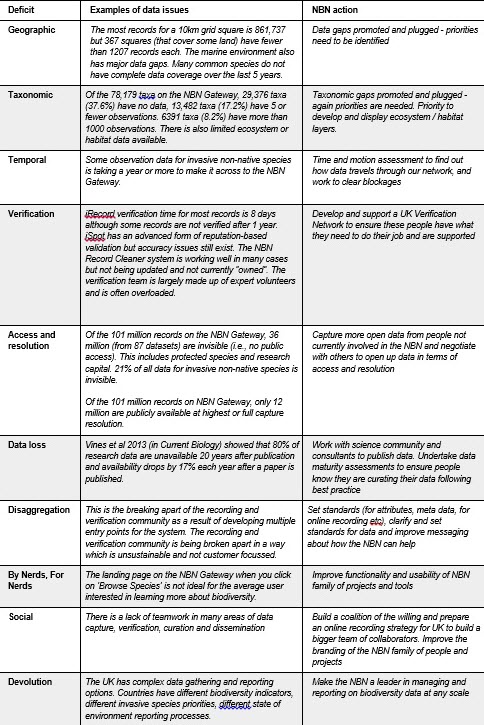The NBN Trust spoke at a Data Deficits workshop organised by the British Ecological Society on 22 September 2014. This article is a summary of this presentation. Thanks go to Graham French and Paula Lightfoot who supplied data tables and statistics to the NBN Trust for use in the talk.
Article written by John Sawyer and Rachel Stroud, NBN Trust
The concept of Nature-Deficit Disorder has been around for many years, coined by Richard Louv who wrote Last Child in the Woods. It has been estimated that fewer than a quarter of UK children regularly use their local natural areas and over 75% of children aged 8-12 years old are “disconnected from their natural environment” causing health and behavioural problems, as well as creating an ecologically illiterate population. The NBN Trust suggests that ‘Data-Deficit Disorder’ meanwhile has played a significant part in this gradual disconnect from nature. We propose a definition as:
- Humans have limited access to data and information about the natural world and this has consequences: Bad decision-making causing destruction / decline of significant ecological sites
- Reduced opportunities to learn about ecology and ecosystem function
- Reduced research capability and application impact
- Inefficient natural resource management

We assume that our desire to share data is because we believe it is in the best interests of the natural world. With an ever growing population becoming increasingly removed from nature, the task of protecting our nature becomes steadily harder. We believe that the NBN has a big role to play in reversing ‘Data-Deficit Disorder’ and helping to protect our environment.
The NBN Trust has identified ten data deficits (see Table 1), which affect learning about wildlife, research programmes, wildlife conservation, recording of wildlife, state of environment reporting, natural capital programmes and offsetting. As a result ‘Data-Deficit Disorder’ is creating a deficit in innovation, preventing us seeing the broader picture of how biological records may be applied and, in many cases, reducing our ability to captivate and inspire those who can individually start making a difference.
These deficits include incomplete geographic data holdings, too much time taken to verify and use records, too much time taken for a record to be ‘delivered to market’, reduced resolution of data (of the 101 million records on the NBN Gateway, only 12 million are publicly available at highest or full capture resolution), increased loss of data with each passing year and at times an apparent lack of team work towards a shared common goal (see Table 1 for a full list of examples of the issues).
Whilst deficits exist, most are treatable and with teamwork the NBN Trust believes we can minimise their impact on conservation, environmental decision making, research, recording, education and learning. So what does ‘Data-Deficit Disorder’ mean for the NBN? We present some ideas in Table 1 for how to tackle the deficits but we hope to hear your views as we renew the NBN strategy. The NBN Trust wants to build a critical mass of people that will work together to deliver open, connected, usable data. The NBN Trust will therefore support members and strengthen the Network, we will work to increase use, visualisation and interoperability of data. The NBN Trust will work to increase engagement of the public, to inform communities about their neighbourhood wildlife and the value of data and information to their local decision-making. We will improve standards and data quality and we will continue to increase data diversity types and coverage. The NBN will do all this to inform state of environment reporting, conservation assessments (Red-listing of species and ecosystems), decisions about offsetting, and nature’s services and natural capital programmes.
That work will minimise deficits and will maximise innovation and positive environmental outcomes. If you want to get involved and help us find solutions for tackling ‘Data-Deficit Disorder’ then register for our NBN Gateway workshops on Thursday 20 November at the Natural History Museum and come to the NBN conference on Friday 21 November at the Royal Society, London. Alternatively, come to a regional NBN strategy workshop to be held throughout the country in October and November (see NBN website for more details).
Read the full presentation on Data Deficit Disorder given on 22 Sept 2014 by NBN CEO
